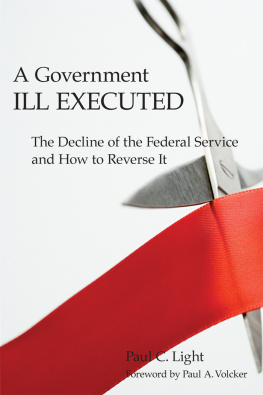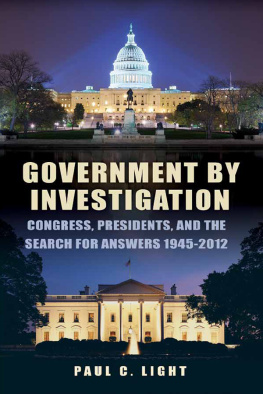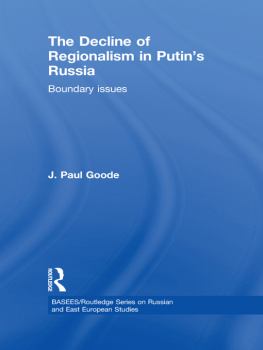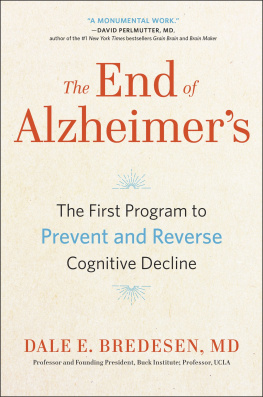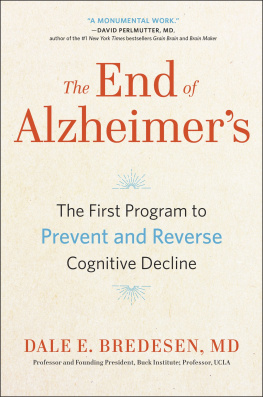A Government Ill Executed
A Government Ill Executed:

THE DECLINE OF THE FEDERAL SERVICE AND HOW TO REVERSE IT
PAUL C. LIGHT
HARVARD UNIVERSITY PRESS
Cambridge, Massachusetts, and London, England
Copyright 2008 by the President and Fellows of Harvard College
All rights reserved
Printed in the United States of America
First Harvard University Press paperback edition, 2009
Library of Congress Cataloging-in-Publication Data
Light, Paul Charles.
A government ill executed : the decline of the federal service and how to reverse it / Paul C. Light.
p. cm.
Includes bibliographical references and index.
ISBN 978-0-674-02808-1 (cloth : alk. paper)
ISBN 978-0-674-03478-5 (pbk.)
1. Civil serviceUnited States. 2. Public administrationUnited States. I. Title.
JK692.L534 2008
351.73dc22 2007044648
Contents
by Paul A. Volcker
Nothing is more certain in American political life than complaints about the performance of the federal government. At the same time, there are insistent demands for government to do moreto provide more security, personal, national, and financial; to improve health care; to protect the environment; to build transport systems; not least to build a strong and independent judiciary.
But somehow, the contradiction between the two discordant opinions is never really understood or addressed. The challenge for public administrationwhat it takes to improve performanceis hardly addressed.
Universities vie to nurture schools of business administration, and students covet the MBA. Prestigious schools of law and medicine attract many of our best young people, including those eager to make a difference. But with some significant exceptions, schools of public administration wither on the vine without needed financial support, academic priority, prestige, or public interest.
Paul Lights important new book irrefutably documents the challenge that so many of us sensethat government performance at all levels has deteriorated over these recent decades and too little is being done to change the picture.
For all of us interested in government, it is not a pretty picturereally not tolerable for a strong democracy that purports to be the benign world leader, with unique responsibilities as the one and only superpower.
In that sense, the book is a call to actionaction beyond campaign rhetoric or popular catchphrases that typically lack substance or fail to sustain effort. Paul Light goes further. Drawing from decades of experience and analysis, he sets out the substance of what is required for real and lasting reform. As he argues, the problems exist at every level of the federal hierarchy.
There is much to be done to repair this damage, but action must start with the call to service that framed the recommendations of the 1989 National Commission on the Public Service, which I chaired. As the very first paragraph of the 1989 report argued:
The central message of this report of the Commission on the Public Service is both simple and profound, both urgent and timeless. In essence, we [call] for a renewed sense of commitment to the highest traditions of the public serviceto a public service responsive to the political will of the people and also protective of our constitutional values; to a public service able to cope with complexity and conflict and also able to maintain the highest ethical standards; to a public service attractive to the young and talented from all parts of our society and also capable of earning the respect of all our citizens.
This call to service has become Lights passion. It frames this book and its forceful program for reformreform not in the sense of one all-encompassing program but rather an analysis of the many steps necessary to make a real difference.
It has also created a book that should be required reading for every member of Congress and the president. It outlines the key issues they must address if the federal government is to meet its responsibility to faithfully execute all the laws. If Congress and presidents do not act soon, they can expect more breakdowns and disappointments.
Government reform may not be an exciting issue on Capitol Hill and in the White House, but I believe over time it will arguably be the most important. The crisis in competence was at the root of the failure to respond quickly to Hurricane Katrina, the flawed intelligence that led to the war in Iraq, the Space Shuttle Columbia disaster, and a host of other recent federal disappointments. This is not the time for further incremental reform that Congress and presidents so often throw at federal management problems. It is the time for bold action. Paul Light provides an accessible agenda for rebuilding the public service.
This book is based on Alexander Hamiltons warning about the dangers of a government ill executed. As he argued in Federalist No. 70, A feeble execution is but another phrase for a bad execution; and a government ill executed, whatever it may be in theory must be in practice, a bad government. A government well executed was essential to virtually every challenge that faced the new republic.
More than two hundred years later, however, the federal government seems plagued by bad execution.
The stories are all too familiar: taxpayer abuse by the Internal Revenue Service, security breaches at the nations nuclear laboratories, missing laptops at the Federal Bureau of Investigation, the Challenger and Columbia space shuttle disasters, breakdowns in policing everything from toys to cattle, the sluggish response to Hurricane Katrina, miscalculations about the war in Iraq, a cascade of wasteful government contracts, continued struggles to unite the nations intelligence services, agonizing backlogs at the Social Security Administration and the Passport Bureau, near misses on airport runways, staff shortages across the government, porous borders, mistakes on airline passenger screening lines, the subprime mortgage meltdown, destruction of the CIA interrogation tapes, and negligent medical care of veterans. As the stories have accumulated, the federal governments customer service ratings have plummeted, and now rank with those of the airlines and cable TV.
This is not to suggest that the federal government is a wasteland of failure. To the contrary, the federal government accomplishes the impossible every day. Yet, if the federal government is still far from being ill executed, it is not uniformly well executed, either.
Hamiltons warning reflected more than his own experience with a government ill executed during the Revolutionary War. And he soon began setting precedents for both.
A Government Ill Executed
Imagine for a moment the worst possible circumstances for creating and sustaining that energetic federal service.
First, the federal service would have an agenda of staggering reach that would barely keep pace with the resources for faithful execution. Carved from the hopes and dreams of a great society, the federal service would be asked to convert dozens of great endeavors into lasting achievementsfrom guaranteeing voting rights to building interstate highways, from reducing disease to helping the homeless, from protecting endangered species to waging war on terrorism, from protecting retirement security to providing humanitarian relief when crisis strikes.
The federal service would not just have a long list of responsibilities, however. It would also have a long list of frustrations. After all, it is one thing to launch a great endeavor, and quite another to produce a great achievement. Even as Congress and the president would continue adding new missions to the list, they would belittle the federal service in their campaigns for office, starve the government of needed resources, and expect more for less with each passing year.
 THE DECLINE OF THE FEDERAL SERVICE AND HOW TO REVERSE IT
THE DECLINE OF THE FEDERAL SERVICE AND HOW TO REVERSE IT
